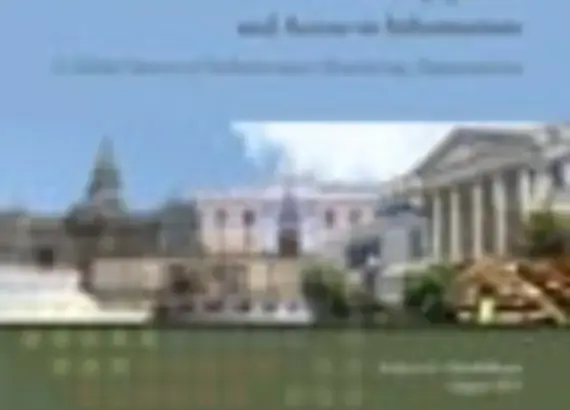
Success Story
Study Explores Efforts of Citizen Organizations to Monitor Parliaments
Because they can give voice to citizen concerns, oversee public spending, and help to spur economic and democratic development through legislation, parliaments are increasingly recognized by the international community for their potential role in deepening democracy. At the same time, citizen groups have become more active in monitoring parliaments, assessing their performance and coming up with new ways to enable citizens to participate in the political process.
A new publication by NDI and the World Bank Institute, Strengthening Parliamentary Accountability, Citizen Engagement and Access to Information: A Global Survey of Parliamentary Monitoring Organizations, examines the work of 191 parliamentary monitoring organizations (PMOs) monitoring 82 national parliaments worldwide. Based on a survey of PMOs, interviews with PMO representatives, and a review of PMO websites and documents, the 240-page publication offers a number of important findings about this type of political process monitoring.
Among PMOs surveyed, more than 40 percent have adopted advanced information and communications technologies (ICTs) that allow citizens, for example, to sift through and make sense of vast amounts of parliamentary information on such topics as votes, the content of floor debates or committee deliberations.
Some groups generate maps showing the source of political contributions, timelines of member attendance and participation, or other graphics that help users make sense of complex political processes. Still others help citizens engage their member of parliament (MP) or provide online forums for commenting on draft legislation.
 NosDeputes.fr website of Regards Citoyens, a French PMO, provides a timeline display of activities of National Assembly members and access to the all floor speeches made by each member.
NosDeputes.fr website of Regards Citoyens, a French PMO, provides a timeline display of activities of National Assembly members and access to the all floor speeches made by each member.Many PMOs also support parliamentary reform by engaging directly with parliaments. The Pakistan Institute of Legislative Development and Transparency (PILDAT), for example, has contributed to the National Assembly of Pakistan’s efforts to bolster its performance and democratic functioning by working with MPs, parliamentary staff, analysts and members of the media to conduct an assessment of the Assembly and generate recommendations.
The study revealed that beyond holding MPs to account, many PMOs seek to strengthen parliaments by testifying on reform issues, such as improving parliamentary transparency or performance in combatting corruption, fulfilling information requests on specific issues, or, in some cases, working with parliament to develop or strengthen MP codes of conduct. For example, the Al-Quds Center for Political Studies worked to secure the signatures of candidates running for parliament last year on an “Agreement with Jordan” that included a pledge to develop a parliamentary code of conduct once elected.
In other instances, PMOs use devices such as scorecards that compare member performance to improve citizen understanding of parliament, although the quality of the scorecards and the methodologies used to produce them vary widely. Greater consultation between MPs and PMOs can be useful in both improving the quality of these efforts, as well as the ability to help strengthen the institution of parliament.
“We want to influence [MPs] to take their jobs more seriously… Constituents have no tools to follow their MPs. There are no structures to help that interaction between citizens and MPs. So at least now, we are trying to use the Scorecard to structure this relationship and make MPs more accountable.”
- David Pulkol, African Leadership Institute (Uganda)
PMOs face a number of common challenges and sharing information can provide a big lift. The survey found that 63 percent of PMOs say they lack access to needed parliamentary information. The lack of information is a major obstacle to strengthening parliamentary institutions, improving the quality of PMO efforts and engaging citizens more deeply in the democratic process. For a number of parliaments, this lack of information extends to voting records and draft legislation. A majority of PMOs also list insufficient financial support as an obstacle to effective monitoring.
The report highlights a variety of good practices developed by PMOs for dealing with these challenges. International norms and comparative experience can be useful in identifying ways in which parliaments can become more transparent in their work and in presenting information to the public. PMOs have begun to share strategies for using information obtained through monitoring and assessment in effective public awareness or advocacy campaigns. Some PMOs have also become more effective by working with journalists to improve their coverage of parliaments, while others have successfully encouraged media outlets to link their stories to PMO websites that contain background information on parliament.
Because PMO monitoring tends – even if unintentionally – to focus attention on parliamentary underperformance or malfeasance, the report provides examples of PMOs that have sought to encourage good parliamentary practices, such as Directorio Legislativo (Argentina) does by awarding a prize to the most innovative MP.
In its final section, the report proposes recommendations for consideration by international donors working with PMOs. These include facilitating greater networking and collaboration among PMOs, including collaboration by PMOs and ICT developers on generic monitoring tools that can be adapted to the needs of individual PMOs in particular country contexts. Given the wealth of creative ideas and effective monitoring techniques developed by PMOs, increased networking and peer-to-peer sharing has the potential to greatly improve monitoring efforts, as well as allow PMOs to advocate, on a regional and global level, for improved transparency of parliamentary information.
NDI is currently working to aid PMO interaction and information sharing via the AGORA Portal for Parliamentary Development, which offers social networking features that spur the sharing of information and good practice.
Related:
Published Oct. 11, 2011
